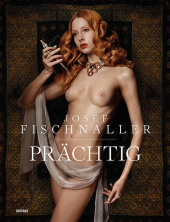 Neuerscheinungen 2017Stand: 2020-02-01 |
Schnellsuche
ISBN/Stichwort/Autor
|
Herderstraße 10
10625 Berlin
Tel.: 030 315 714 16
Fax 030 315 714 14
info@buchspektrum.de |

Josef Fischnaller
Josef Fischnaller
Prächtig
Vorlage: Fischnaller, Josef
2017. 208 S. m. 100 Abb. 14.25 in
Verlag/Jahr: DISTANZ 2017
ISBN: 3-9547619-6-3 (3954761963)
Neue ISBN: 978-3-9547619-6-8 (9783954761968)
Preis und Lieferzeit: Bitte klicken
"I don´t paint, I photograph."
Josef Fischnaller (born 1964 in Austria, lives and works in Berlin) became known for his powerful reinterpretations of world-famous masterpieces of art history. He finds inspiration in artists like Caravaggio, Titian, and Vermeer, and stages celebrities and friends in his work. Fischnaller skillfully blurs the boundaries between painting and photography by "painting with light" and combines works of art from past centuries with the precision and focus of digital photography. He nonchalantly transposes traditional iconographic symbols into the present with a great love for detail, which allows him to turn the coldness of digital imagery into the warmth of the analog.
Only at the second glance, the viewer discovers small ironic elements: an elegant dress made of garbage bags, the collar of white mice, and hidden in the still life of sausages and ham a piece of soap resembling a pistol. With a text by Manfred Klimek and an interview with Moritz von Uslar.
Josef Fischnaller (b. in Austria, 1964; lives and works in Berlin) became known for his powerful reinterpretations of world-famous masterpieces of art history. He finds inspiration in artists like Caravaggio, Titian, and Vermeer, and stages celebrities and friends in his work. Fischnaller skillfully blurs the boundaries between painting and photography by "painting with light," and combines works of art from past centuries with the precision and focus of digital photography. He nonchalantly transposes traditional iconographic symbols into the present with a great love for detail, which allows him to turn the coldness of digital imagery into the warmth of the analog. Only at the second glance, the viewer discovers small ironic elements: an elegant dress made of garbage bags, the collar of white mice, and hidden in the still life of sausages and ham a piece of soap resembling a pistol. With a text by Manfred Klimek and an interview with Moritz von Uslar.


